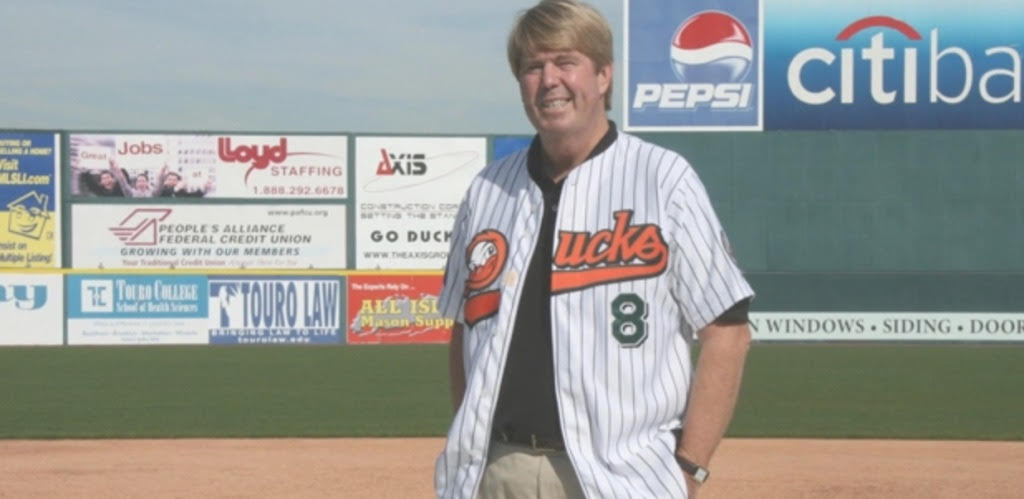In 1986, Frank Boulton received a phone call from a close friend with an intriguing offer: a chance to acquire a 25% stake in a minor league baseball team.
The asking price for the stake was $50,000. The friend was Howard “Blackie” Bowen, his former college roommate at Villanova University and the best man at Boulton’s wedding. The team was in Hagerstown.
Bowen told Boulton that the owners of the Hagerstown Suns were looking for partners. At the time, Bowen didn’t want to participate but he thought that Boulton would be interested.
Boulton passed on the offer, which in those days seemed too pricey. But after discussing the deal with Bowen “I kind of got the bug and I started looking into minor league baseball and what was going on,” said Boulton.
Now, 37 years later, Boulton is a major player in America’s independent baseball leagues. He recently partnered with Bowen and others to create a new independent league baseball team for Hagerstown, which lost its old team in 2021. The new team, which doesn’t yet have a name, will be the latest in a long line of teams that Boulton has partly or wholly owned (he declined to give an exact number) since 1990 when he paid $500,000 to acquire a 50% stake in the Prince William Cannons, an affiliate of the New York Yankees.
“Those of us on the Hagerstown side wouldn’t be involved if Frank weren’t involved because none of us know anything about running a baseball team,” Bowen said. “So we’re delighted to have Frank there.”
While Boulton isn’t well known in Maryland, he’s influential on his home turf of Long Island, New York, where he wears a lot of caps. He’s the founder and chief executive of the Atlantic League of Professional Baseball, an independent league that is trying to expand the number of minor league teams in mid-size towns across the U.S.
“Those of us on the Hagerstown side wouldn’t be involved if Frank weren’t involved because none of us know anything about running a baseball team.”
He’s in his 23rd year as the owner of the Long Island Ducks, which have won four Atlantic League championships. Previously, in addition to the Cannons, Boulton owned the Albany-Colonie Yankees, another affiliate of the New York Yankees, and the Peninsula Pilots, which became the Wilmington Blue Rocks, an affiliate of the Kansas City Royals. He sold all three teams before forming the Atlantic League.
Boulton’s Atlantic League entered into a partnership with Major League Baseball a few years ago to help create new baseball rules and try out equipment and facilities by testing them out first at minor league ballparks. The Atlantic League is essentially “a Petri dish for experimental rules,” he said.
For example, new MLB rules that came into place this season, including a pitch timer, limits on defensive shifts and bigger bases, were first tested in the Atlantic League. A few weeks ago, MLB announced that it was extending its partnership with the Atlantic League to experiment with other potential changes, including testing the designated pinch runner rule that will allow a designated pinch runner to substitute at any point during the game as a baserunner. On its website, the MLB said the possible change is intended to inject more speed into the sport.
Boulton grew up and still lives in Brightwaters, New York, a small town that faces the Great South Bay on Long Island, about 49 miles from Manhattan. After graduating from Villanova, he worked for 23 years as a bond trader on Wall Street, eventually becoming the senior managing director of the government bond department at the brokerage firm Smith Barney, which is now part of Morgan Stanley.
Boulton said he formed the Atlantic League after the New York Mets blocked his attempt to move the Albany-Colonie team from Albany to Long Island. In the New York metro area, most of the city and the northern suburbs were considered Yankee territory while Long Island and Staten Island were considered Mets territory. Boulton said he was told that he could not operate a Yankees affiliate in Mets’ territory.
The MLB is exempt from antitrust laws, which critics argue allows their team owners to thwart competition. Independent league teams, however, are protected by antitrust laws and are able to construct new stadiums and operate almost anywhere.
Boulton said another reason for creating the Atlantic was to provide employment opportunities for players who aren’t able to play in the major leagues due to injuries, skill level, fatigue or other reasons.
“I wanted to create a boutique league that played at the top of the food chain with guys that were the best 200 players in the world that weren’t signed to a major league contract,” Boulton said.
Some players make repeated trips between the major and minor leagues. Consider Michael Tonkin, currently a pitcher for MLB’s Atlanta Braves. After a long career with the Minnesota Twins and its affiliates, he was released in 2017 and played for several minor league teams, landing on the Long Island Ducks team in June 2019. Two months later, his contract was sold to MLB’s Arizona Diamondbacks. Two years after that, he returned to the Ducks, where he stayed for four months before joining Toros de Tijuana in the Mexican League. He signed with Atlanta in January 2022.
Despite the opportunities that the Atlantic League has given to players, Boulton said that his main goal is “to be part of an organization that provides affordable family entertainment to that community.”

